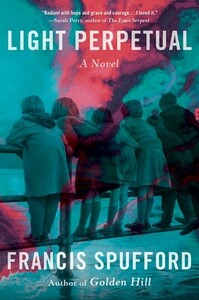You need to sign in or sign up before continuing.
Take a photo of a barcode or cover
emotional
reflective
medium-paced
Plot or Character Driven:
Character
Strong character development:
Yes
Loveable characters:
Complicated
Diverse cast of characters:
No
Flaws of characters a main focus:
Yes
Graphic: Domestic abuse, Mental illness
Minor: War
emotional
inspiring
reflective
medium-paced
Plot or Character Driven:
A mix
Strong character development:
Yes
Loveable characters:
Complicated
Diverse cast of characters:
Yes
Flaws of characters a main focus:
Complicated
challenging
mysterious
slow-paced
Plot or Character Driven:
Character
Strong character development:
Yes
Loveable characters:
Complicated
Diverse cast of characters:
Yes
Flaws of characters a main focus:
Complicated
I didn't really like the lack of a complete plot, it was an interesting concept and well written just not really for me
I won this book as a Goodreads Giveaway from Amazon Prime. The premise of this book had me interested - the story of children who died in a bombing, but if they had lived, through the 20th century. There were moments of brilliance - descriptions of Alec with his granddaughter and son, a journey through the mind of someone struggling with schizophrenia - but i wonder if Spufford had focused on one or two characters, if the stories and setting could have been built out a bit more.
adventurous
reflective
medium-paced
Plot or Character Driven:
A mix
Strong character development:
Yes
Loveable characters:
Complicated
Diverse cast of characters:
Yes
Flaws of characters a main focus:
Yes
I liked the prose of this book and enjoyed running through the course of each character's life. However, I wish more was done with the concept set up in the beginning (children die in the bombing, but what would their lives be like if they lived)?
I don't know how it couldve been done differently, but I'm a little disappointed because the beginning of the book gripped me completely, but then the rest of the book just proceeded as the stories of the lives of various characters (irrespective of the set up in the beginning).
I liked it, but it's missing something for me.
I don't know how it couldve been done differently, but I'm a little disappointed because the beginning of the book gripped me completely, but then the rest of the book just proceeded as the stories of the lives of various characters (irrespective of the set up in the beginning).
I liked it, but it's missing something for me.
Graphic: Violence, Murder, War
Moderate: Eating disorder, Homophobia, Rape, Xenophobia, Schizophrenia/Psychosis
I understand why Light Perpetual hasn't been for everyone, but it was definitely for me. I found it searing and touching and deeply true on people and all our flaws.
The premise, inspired by a real bombing during the Blitz, is that a V2 bomb kills five children inside a Woolworths. We then get a counterfactual narrative: the stories of these five people had they not died.
While some people think that the premise wasn't necessary, and that Spufford could have written a more straightforward story of Londoners in the post-war period, I thought the opening scene was effective. Firstly, wow, the detail is top notch. It also sets up the dichotomy of what the novel is all about: the interplay between the ordinary and the extraordinary in our lives. A bomb dropped during the Blitz—there are so many examples of that. Standard. But, for the families and individuals affected, it's quite literally life changing (or ending, rather).
Spufford goes on to examine how the extraordinary and the ordinary coexist in our lives in so many other ways. As Jo, one of our five protagonists, observes of her students, "They long to hurry. Everything they are is oriented towards a future which they seem to themselves be having to wait for forever, enduring the great teenage boredom in which first kiss, first party, first love, approach at maddening snail's pace: but which if you're old enough to count time in decades you know is going to be on them in a flash, imminent, irresistible. In almost no time at all, possibility will be swapped for actuality." The novel is littered with so many elegant, accurate observations just like this, on honestly, so many things: white supremacy, class struggle, the value of work, familial bonds, divorce, mental health, and of course, life and death.
The narrative structure is definitely different in that we get only one day of each character every 15 years, and it doesn't necessarily always make you desperate to turn the page. But, so much of reading for me is mindset, and I think reading this like you might read a collection of short stories is the best way to approach and enjoy the story.
The premise, inspired by a real bombing during the Blitz, is that a V2 bomb kills five children inside a Woolworths. We then get a counterfactual narrative: the stories of these five people had they not died.
While some people think that the premise wasn't necessary, and that Spufford could have written a more straightforward story of Londoners in the post-war period, I thought the opening scene was effective. Firstly, wow, the detail is top notch. It also sets up the dichotomy of what the novel is all about: the interplay between the ordinary and the extraordinary in our lives. A bomb dropped during the Blitz—there are so many examples of that. Standard. But, for the families and individuals affected, it's quite literally life changing (or ending, rather).
Spufford goes on to examine how the extraordinary and the ordinary coexist in our lives in so many other ways. As Jo, one of our five protagonists, observes of her students, "They long to hurry. Everything they are is oriented towards a future which they seem to themselves be having to wait for forever, enduring the great teenage boredom in which first kiss, first party, first love, approach at maddening snail's pace: but which if you're old enough to count time in decades you know is going to be on them in a flash, imminent, irresistible. In almost no time at all, possibility will be swapped for actuality." The novel is littered with so many elegant, accurate observations just like this, on honestly, so many things: white supremacy, class struggle, the value of work, familial bonds, divorce, mental health, and of course, life and death.
The narrative structure is definitely different in that we get only one day of each character every 15 years, and it doesn't necessarily always make you desperate to turn the page. But, so much of reading for me is mindset, and I think reading this like you might read a collection of short stories is the best way to approach and enjoy the story.
adventurous
challenging
emotional
reflective
medium-paced
Plot or Character Driven:
Character
Strong character development:
Yes
Loveable characters:
Yes
Diverse cast of characters:
Yes
Flaws of characters a main focus:
Yes
Hated most of the characters and reading about their view of the world put me in a bad mood
challenging
informative
slow-paced
Plot or Character Driven:
Character
Strong character development:
Yes
Loveable characters:
No
Diverse cast of characters:
No
Flaws of characters a main focus:
Yes
Francis Spufford puts words together beautifully and I have no doubt that all of the historical elements of the five lives this book provides glimpses into throughout the second half of the twentieth century are impeccably researched. I would describe it as admirable, informative and... a real struggle to read. The concept is deeply unsatisfying - after beginning in school together, the five lives barely touch each other, so just as you start to engage with a character you jump to somebody else and by the time you meet any of them again it is more than a decade later and they've become a seemingly different person - which may indeed be the case IRL, but it doesn't encourage any emotional connection for the reader. It felt, to me, that Spufford had made a list of things he wanted to write about (or, possibly, reading the acknowledgements, things his in-laws knew about) and built each chapter around those - skin heads, opera, Afro-Caribbean cuisine, trade unions - and the chapter became about that thing rather than the character. I was intrigued to see where each character's path would lead them, but I desperately wanted some kind of plot to give any of it purpose. At the end I thought, so what? Maybe that's exactly the feeling he wanted to elicit - these are just people's lives, the plot is just time, there's nothing more for any of us than that. I can't fault the often beautiful prose or artistry of what Spufford has created here, but it felt meaningless to me.
informative
medium-paced





